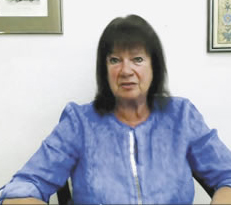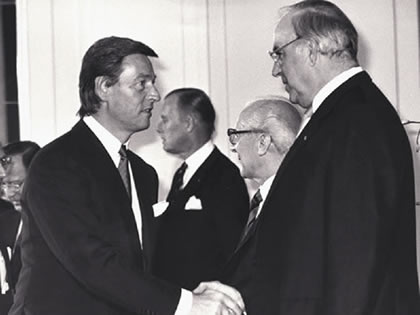Undo the Paradigm Shift
Resulting
from the Assassination of Herrhausen
August 2016
[PDF version of this article]appears in the July 29, 2016 issue of Executive Intelligence Review.and is re-published here with permission.
 Helga Zepp-LaRouche |
During a discussion period at the July 23 Northwest Strategic Seminar in Seattle, Washington, entitled: “Humanity at the Brink—The United States Must Join the Eurasian Project,” Helga Zepp-LaRouche responded to a question concerning the necessity of saving Deutsche Bank, as follows:
Zepp-LaRouche: Let me just add this, because people may not be familiar with the significance of Alfred Herrhausen. Alfred Herrhausen was the chairman of Deutsche Bank at the time when the Berlin Wall came down, and he was assassinated at the end of November, actually three weeks after the Berlin Wall had come down. And that particular murder had as much significance for the paradigm shift to the worst in Germany, as the assassination of John F. Kennedy did for the United States.
 Wikimedia Commons
Wikimedia Commons John F. Kennedy one month earlier, at Rice University in Houston, announcing the goal to put a man on the moon |
If you remember, Kennedy was very, very optimistic. He had the idea of space travel, of unlimited self-perfection of human beings, of overcoming poverty in the developing countries—just an absolute optimistic world outlook and image of man. And when he was killed and his murder was covered up, the people of the United States became pessimistic, so much so that recently I have been saying that Americans are almost as pessimistic as the Germans.
But for Germany, this was absolutely crucial, because—maybe the older ones among you remember the unbelievable circumstances when the Wall came down and people from East Germany came, adancing on the Berlin Wall, hugging each other, crying; it was an unbelievable moment in history.
And if Herrhausen would have continued to be the advisor of Helmut Kohl, the whole question of unification would have taken a completely different turn, because he was the last moral banker, in Europe, at least that I know of. He wanted to forgive the debt of the Third World because, he said, this debt is not payable anyway. He wanted to put the European, German-Russian relationship on an even level. He wanted to develop Poland with the means of the Kreditanstalt used in the reconstruction of postwar Germany. So he had many, many sound policies, and all the people who knew him, said that he was a great human being, more important even than being a great banker.
 Alfred Herrhausen (left), Chairman of Germany’s largest commercial bank,Deutsche Bank, greets German Chancellor Helmut Kohl. |
His car was blown up as a message to Helmut Kohl: “Do not dare to use the moment of German unification to develop an independent, sovereign policy.” And then, as we now know, Margaret Thatcher launched a campaign against Germany. Mitterrand, according to Jacques Attali who was one of his closest advisors and who wrote a biography of Mitterrand, wrote that Mitterrand threatened Germany with war at that moment, if Germany would not be ready to give up [its sovereign currency] the D-mark and replace it with the European common currency, the euro.
Kohl knew at the time that the European common currency would not work without political union, and that the euro was against German interests; but he was basically surrounded by France, Britain, and the United States who all told him, you better capitulate and give up the D-mark as the price for unification.
So it was really this murder of Alfred Herrhausen which is the reason that the great historical chance of 1989 did not lead to a new peace order of the 21st Century, which at that time would have been possible.
We then proposed—especially Lyn, the development of the Productive Triangle Paris-Berlin-Vienna. This is an area the size of Japan, and still has the most productive concentration of especially the very productive, very innovative, very creative Mittelstand, the middle-level industry. The idea was to take that and develop what we called “development corridors” to Poland, to Ukraine, to the Balkans, and transform the Comecon countries with Western technology. And when the Soviet Union disintegrated in ’91, we expanded that Productive Triangle to become the Eurasian Land-Bridge, to provide development corridors combining the industrial and population centers of Europe with those of Asia, through transport and development corridors: And that is what we called, already then, the New Silk Road.
So we campaigned for this, for 25, 26 years, and now it is very good that the New Silk Road is on the agenda. But all the destruction of Russia from ’91 to ’94, whereby the industrial potential of Russia was destroyed, and collapsed to only one-third, was the result of the same geopolitical policies which had led to the murder of Herrhausen. And if you want to cure this policy, including the war danger, which right now is very, very acute, we have to go back and change the policies, do a reset.
And Deutsche Bank is about to blow—as a matter of fact, just yesterday, reports were leaked that they’re considering giving up universal banking and instead have an internal separation of their banking branches between the commercial branch which gives credit to industry, and separating that completely from their investment branch, which is quite an admission, because Deutsche Bank was always considered the universal banking model and now they basically admit that this is not working.
Obviously, such reform alone is not sufficient, but it is an interesting reflection of our campaign. So I would like to encourage you to study this period of history, because the connection between the murder of Kennedy and the murder of Herrhausen, gives you the clue of where things went wrong in the history of both the United States and Germany. And if you want to remedy it, we have to get the United States back on the track of Roosevelt and Kennedy and we have to get Germany back on the track of Alfred Herrhausen, if we want to get out of this crisis.
So please do not block on this campaign.
